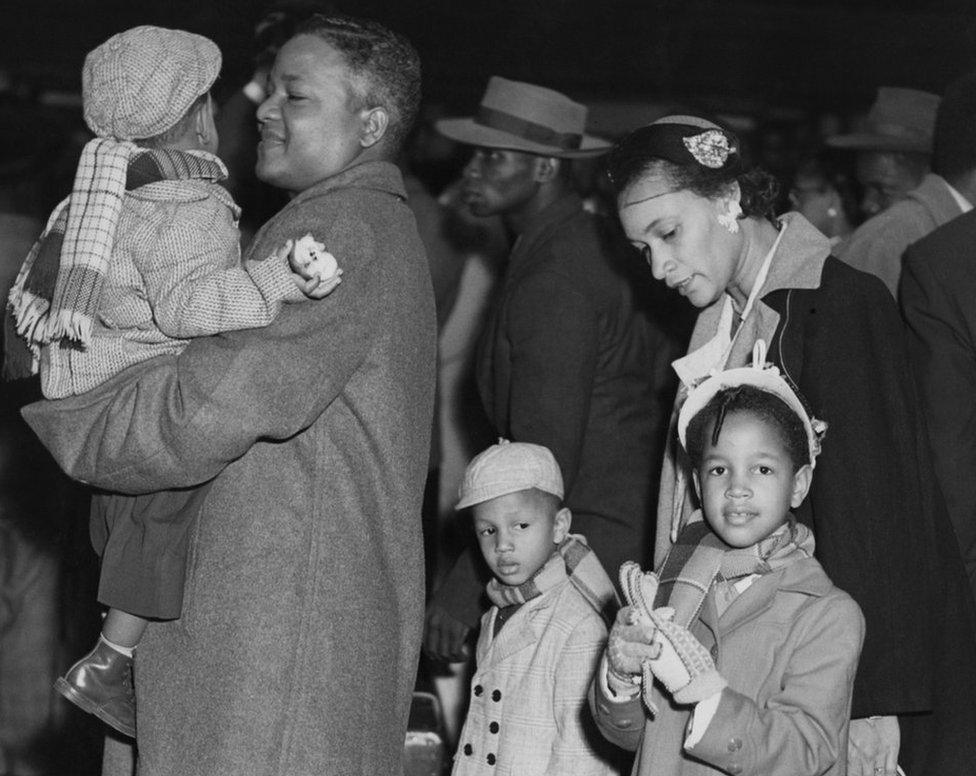Windrush scandal: MPs refer Home Office to equalities watchdog
- Published

The Empire Windrush arrived at Tilbury Docks, Essex, on 22 June 1948
MPs have reported the Home Office to the equalities watchdog over the Windrush scandal, accusing it of unlawful discrimination.
The group of 87 says the Home Office discriminated as a "direct result" of so-called hostile environment policies.
The letter to the Equalities and Human Rights Commission claims the government broke, and is breaking, equalities law.
The Home Office said it was "committed to righting the wrongs experienced by the Windrush generation".
The Windrush scandal involved the wrongful detentions and deportations of some members of the Windrush generation - the thousands of people who travelled to the UK from the Caribbean in the years after World War Two.
In the letter, David Lammy - chair of the all party parliamentary group on race - says the Home Office is acting in breach of equalities legislation by "routinely" discriminating on the basis of Britons' race.
It adds: "Clearly, the Windrush scandal represents one of the gravest breaches of equality law and the rights of British citizens in recent memory."
Windrush scandal: One year on
An estimated 500,000 people now living in the UK, who arrived between 1948 and 1971 from Caribbean countries, have been called the Windrush generation, in reference to a ship which brought workers to the UK in 1948.
They were granted indefinite leave to remain in 1971 but thousands were children travelling on their parents' passports, without their own documents.
Changes to immigration law in 2012 meant those without documents were asked for evidence to continue working, access services or even to remain in the UK.
Some were held in detention or removed, despite living in the country for decades.
A review by a Home Office taskforce of 11,800 Caribbean cases identified 164 who were deported or detained who might have been resident in the UK before 1973.
The taskforce has traced 137 of those people, of whom 19 are known to have died.
At least 18 would receive a formal apology, the government said last year. This month, the government said there was "no cap" on possible compensation for those affected.

Many of the new arrivals were children

In the letter, the MPs call on the commission to look into how the Home Office contributed to the government's "hostile environment" policy and its impact on the Windrush generation.
They also argue the Home Office breached the public sector equality duty, which means public bodies have to have "due regard" to eliminate discrimination and advance equality.
The signatories are from six different parties, with most from Labour and none from the Conservatives.
They include shadow home secretary Diane Abbott, Green Party MP Caroline Lucas, Luciana Berger from The Independent Group, the SNP's Alison Thewliss and Liberal Democrat Alistair Carmichael.
Glenda Caesar wants compensation for loss of earnings, stress, and lost pension
Mr Lammy said: "The gross mishandling and abuse of the Windrush generation by the Home Office raises serious questions over whether British citizens were discriminated against on the basis of their race and ethnicity, in breach of equalities legislation.
"More than a year after I first raised this in Parliament, nothing has changed. Justice must mean not only due compensation and reparation, but changes to the institution and immigration laws that created this crisis."
The "hostile environment" approach to curbing illegal immigration has been blamed for members of the Windrush generation, who were in the UK legally, being wrongly threatened with deportation.
The letter said the policy was "deeply discriminatory", arguing that black Britons are being discriminated against, while white Britons are not.
A Home Office spokeswoman said: "The home secretary and the immigration minister are committed to righting the wrongs experienced by the Windrush generation and the recently launched compensation scheme is a crucial step in delivering on that commitment.
"The Windrush generation have given so much to this country and we will ensure nothing like this ever happens again, that is why the home secretary commissioned a lessons learned review with independent oversight by Wendy Williams."
The commission said it would consider the issues raised.
- Published3 April 2019

- Published6 March 2019

- Published5 December 2018
